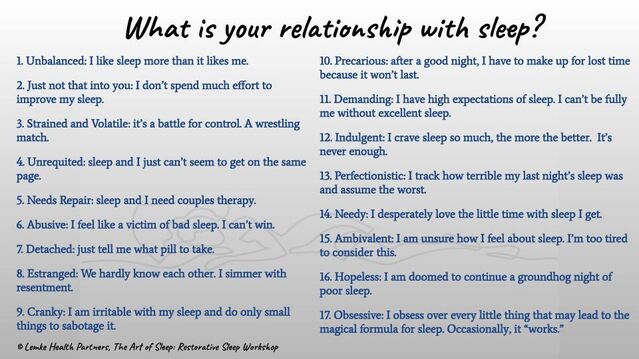Sleep
Does Your Relationship With Sleep Need Repair?
17 ways to describe how you and sleep get along.
Posted August 2, 2022 Reviewed by Michelle Quirk
Key points
- Improving our relationship with sleep is a key factor for getting better sleep.
- Rather than asking what harm is done from poor sleep, turn the question around and ask what benefits poor sleep may have for you.
- Refocus on what you can do today to make the day better for yourself regardless of how you slept.
What is your relationship with sleep? Has it become a wrestling match or tug-of-war? Hostile or ambivalent or unrequited? Is it a safe relationship? Not being able to sleep can feel awful and create animosity between you and your sleep, creating a vicious cycle.
How we relate to anxiety, depression, or any physical ailment can determine how well we cope and take care of ourselves, as well as determine health outcomes and quality of life. Sleep is no different. Perhaps it’s almost too obvious to notice, but improving our relationship with sleep is a key factor for getting better sleep.
Identifying how you and sleep are getting along can help you better manage grief, resentment, anger, bargaining, pleading, obsessing, giving up, and all the other things we do in an attempt to control sleep.
Defining Your Sleep Relationship
How would you define your relationship with sleep?

Repairing Your Relationship With Sleep
Depending on whether you feel apathetic or are in an all-out battle with sleep, there is help to repair this relationship. We can make peace with sleep and surrender to being awake when we don’t want to be. We can feel OK even when tired and foggier than we would like to be if we can muster this mind shift.
We can view our relationship with sleep differently by changing from a begrudging, hostile, or needy relationship to one of healing, care, and letting go. Sometimes it requires professional support, too.
Improving this relationship may require taking action (like keeping a regular wake-up time or reducing alcohol) to support sleep, but often it is doing less (working or worrying) that promotes it. Either way, it helps if we can stop struggling with sleep and drop our end of the rope.
Shift Your Relationship With Sleep
Here are two viewpoints that may seem backward, but help us enter from another perspective in our relationship with sleep:
1. Check in from sleep’s point of view. Rather than asking what harm is done from poor sleep (we know it’s bad), turn the question around and ask what benefits poor sleep may have for you, or at least is trying to have for you. You’ll need to assume some basic level of trust and wisdom of your brain and body to see what your lack of sleep might be trying to do for you.
How is poor sleep trying to help or inform you? Although you might think, “It is only hurting me,” try to see it from another perspective. How is poor sleep playing an adaptive role in your life right now? How might it be trying to help you adjust to something difficult, and what can you do to support your entire nervous system through this? (It could be that restless sleep simply reminds you that you are 100 percent human and 0 percent machine or superhero, despite what you may expect from yourself. If this is the case, read Your Right to Be Ordinary, #5 of Your Individual Rights).
2. Loosen the contingency between good sleep and a good next day. Instead of assuming that we can only have a good day if we sleep well (a very common belief), observe how fear and negative thoughts perpetuate the problem.
Refocus on what you can do today to make the day better for yourself regardless of how you slept. Do you need to make amends, eat better, move more, get outside, laugh, rest, breathe? If the contingency loosens and we have a good day anyway (or at least good enough), it can help us not grip too tightly to our desired sleep outcome tonight.
References
Del Pozo, J. Restorative Sleep Workshop: The Art, Science, and Spiritual Practice of Sleep, August 26-28, 2022. Mercy Center Auburn, California.


